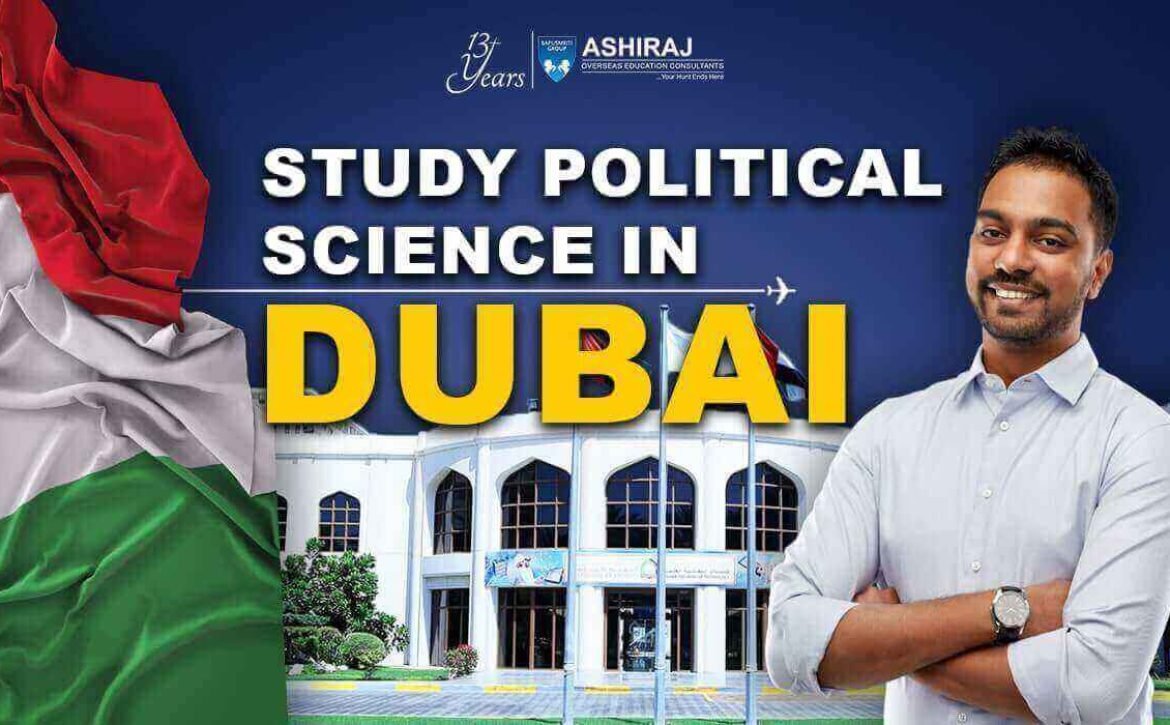
Political Science in Dubai
Political Science in Dubai encompasses a multifaceted exploration of the political landscape within the emirate, reflecting the unique intersection of tradition, modernity, and globalization. As a hub of economic activity and cultural diversity, Dubai’s political dynamics offer a rich tapestry for analysis and study. From its robust governance structures to its role in regional geopolitics, understanding political science in Dubai unveils intricate layers of power, policy, and influence.
With an emphasis on both domestic governance and international relations, the study of political science in Dubai delves into the city-state’s evolving political institutions, policy priorities, and diplomatic engagements. As Dubai continues to assert its presence on the global stage, scrutinizing its political processes and decision-making frameworks becomes increasingly pertinent, offering insights into not only the emirate’s own trajectory but also broader trends shaping politics in the Middle East and beyond.
Why to Study Political Science in Dubai?
- Global Perspective: Dubai serves as a melting pot of cultures and ideologies, offering a unique lens through which to study global politics. Its strategic location and diverse population provide firsthand exposure to international relations and diplomatic dynamics.
- Emerging Power: As Dubai emerges as a significant player in regional and global affairs, understanding its political landscape becomes crucial for those interested in geopolitics. Studying political science in Dubai provides insights into the city-state’s growing influence and impact on the world stage.
- Dynamic Environment: Dubai’s rapid development and ambitious initiatives create a dynamic political environment ripe for analysis. From urban planning projects to economic diversification efforts, students of political science can witness theory put into practice in real-time.
- Networking Opportunities: Being a hub for business and diplomacy, Dubai offers unparalleled networking opportunities for political science students. Access to international organizations, think tanks, and government agencies provides valuable connections for future careers in politics and academia.
- Cultural Immersion: Studying political science in Dubai allows for immersion in a rich cultural tapestry, fostering cross-cultural understanding and appreciation. The city’s tolerance and openness make it an ideal destination for students seeking diverse perspectives on governance and society.
In essence, studying political science in Dubai offers a multifaceted experience that combines academic rigor with practical insights, preparing students for the complexities of a rapidly evolving global political landscape.
Top Universities to Study Political Science in Dubai
University | QS World University Rankings 2023 | Type of University | Average Annual Fees (USD) | Programs Offered |
American University | 301-350 | Private | $15,000 – $20,000 | Political Science, International Relations |
University of Dubai | 401-450 | Public | $10,000 – $15,000 | Political Science, Public Administration |
Zayed University | 451-500 | Public | $8,000 – $12,000 | Political Science, Diplomacy |
Mohammed Bin Rashid University of Medicine and Health Sciences | 501-550 | Public | $12,000 – $18,000 | Political Science, Health Policy |
Canadian University Dubai | 601-650 | Private | $12,000 – $16,000 | Political Science, International Development |
Dubai offers a diverse range of universities catering to political science education, each with its unique strengths and offerings. The American University, a private institution, stands out with its strong rankings and comprehensive programs in Political Science and International Relations. Meanwhile, the University of Dubai, a public university, provides affordable education with a focus on Political Science and Public Administration. Zayed University, another public institution, emphasizes Political Science and Diplomacy, offering a blend of theoretical and practical insights. The Mohammed Bin Rashid University of Medicine and Health Sciences incorporates Political Science into its curriculum, particularly focusing on Health Policy. Lastly, the Canadian University Dubai, a private university, offers programs in Political Science and International Development, catering to students with diverse interests in the field. These universities collectively contribute to Dubai’s vibrant academic landscape in Political Science, fostering the next generation of political leaders and scholars.
Course Curriculum for Political Science in Dubai
- Foundational Studies: Political Science in Dubai typically begins with foundational courses covering political theory, comparative politics, and international relations, providing students with a comprehensive understanding of key concepts and frameworks.
- Regional Focus: Given Dubai’s strategic location in the Middle East, many programs offer courses focusing on regional politics, including the Gulf region’s dynamics, Arab Spring movements, and geopolitical challenges, providing students with insights into local and regional contexts.
- Global Perspectives: Political Science programs in Dubai often incorporate courses on global governance, international organizations, and diplomacy, exposing students to broader global issues and trends, reflecting Dubai’s status as a global hub for business and diplomacy.
- Practical Applications: Many programs integrate practical components such as internships, simulations, and case studies, allowing students to apply theoretical knowledge to real-world scenarios, preparing them for careers in government, NGOs, and international organizations.
- Elective Specializations: To cater to diverse interests, students often have the opportunity to choose elective courses in specialized areas such as environmental politics, human rights, or security studies, enabling them to tailor their education to their career goals and interests.
Political Science in Dubai offers a dynamic and comprehensive curriculum that combines theoretical foundations with practical applications, providing students with a holistic understanding of political dynamics in both local and global contexts.
Eligibility Criteria & Admission Requirements for MS in Political Science in Dubai
- Language Proficiency: Applicants are typically required to demonstrate proficiency in English by providing either IELTS or TOEFL scores. For IELTS, a minimum score of 6.5 is commonly required, while for TOEFL, a score of at least 80 is often expected.
- Standardized Tests: Some universities may require applicants to submit scores from either the GRE or GMAT exams. GRE scores of around 155 for Verbal Reasoning and 155 for Quantitative Reasoning are common expectations. For GMAT, scores around 600 are often considered competitive.
- Documentary Requirements: Prospective students must provide essential documents such as a valid passport, academic certificates demonstrating prior education qualifications, and, if applicable, relevant work experience.
- Student Visa: International students must obtain a student visa to study in Dubai. This process typically involves submitting necessary documents to the relevant authorities and complying with visa regulations.
Test | Minimum Score |
IELTS | 6.5 |
TOEFL | 80 |
GRE | Verbal: 155, Quantitative: 155 |
GMAT | 600 |
Political Science in Dubai universities maintains stringent eligibility criteria to ensure students possess the necessary language proficiency, academic background, and potential for success in their studies.
Documents Required for Studying Political Science in Dubai
- Passport: A valid passport is essential for identification and visa processing, emphasizing the applicant’s nationality and identity.
- Letters of Recommendation (LOR): Typically, two LORs from academic or professional references are required to assess the applicant’s qualifications and suitability for the program.
- Statement of Purpose (SOP): An SOP articulates the applicant’s academic and career goals, highlighting their motivations for pursuing Political Science in Dubai.
- Curriculum Vitae (CV): A comprehensive CV outlines the applicant’s educational background, work experience, academic achievements, and extracurricular activities, providing a holistic view of their qualifications.
- Official Transcripts and Educational Certificates: Official transcripts from high school and any previous academic institutions, along with educational certificates, demonstrate the applicant’s academic performance and qualifications.
- Work Experience Certificate: If applicable, a work experience certificate verifies the applicant’s professional experience and relevant skills in Political Science or related fields.
- Proof of Financial Resources: Applicants must provide evidence of financial stability to cover tuition fees, living expenses, and other related costs during their studies in Dubai.
Political Science in Dubai necessitates a thorough documentation process to evaluate applicants’ academic credentials, professional experiences, and financial capabilities, ensuring a diverse and qualified student body.
Admission Process for Political Science in Dubai
- Research and Shortlisting: Begin by researching universities offering Political Science programs in Dubai. Shortlist institutions based on factors such as rankings, program offerings, and location suitability.
- Review Eligibility Criteria: Carefully review the eligibility criteria for each university, focusing on requirements such as language proficiency tests (IELTS or TOEFL), standardized test scores (GRE or GMAT), and necessary documents.
- Prepare Application Documents: Gather all required documents, including transcripts, educational certificates, passport, letters of recommendation (LORs), statement of purpose (SOP), curriculum vitae (CV), and proof of financial resources.
- Language Proficiency Test: Take the required language proficiency test (IELTS or TOEFL) and ensure you meet the minimum score requirements set by the universities.
- Standardized Tests (if applicable): Prepare for and take the GRE or GMAT if required by the universities. Aim to achieve competitive scores to strengthen your application.
- Submit Application: Complete the online application form for your chosen universities. Upload all necessary documents and pay the application fee, if applicable.
- Wait for Admission Decision: After submitting your application, wait for the university’s admission decision. This process may take several weeks, so remain patient.
- Acceptance and Visa Process: Upon receiving an acceptance letter, initiate the student visa application process. Follow the guidelines provided by the university and the relevant authorities for a smooth transition to studying Political Science in Dubai.
Navigating the admission process for Political Science in Dubai requires thorough preparation, attention to detail, and adherence to deadlines to ensure a successful application.
“Education is the most powerful weapon which you can use to change the world.”
Nelson Mandela
Cost of Political Science Course in Dubai
- Tuition Fees: The tuition fees for Political Science programs in Dubai vary depending on the university, program duration, and whether the institution is public or private. On average, tuition fees range from $8,000 to $20,000 per year.
- Accommodation: Accommodation costs in Dubai can also vary significantly depending on factors such as location, amenities, and whether you choose to live on-campus or off-campus. Monthly rent for a shared apartment typically ranges from $600 to $1,500.
- Living Expenses: It’s essential to budget for living expenses, including food, transportation, utilities, and personal expenses. On average, students may need around $800 to $1,200 per month to cover these costs.
- Books and Supplies: Budget for textbooks, study materials, and other academic supplies, which can amount to approximately $500 to $1,000 per year.
- Health Insurance: International students are often required to have health insurance coverage. The cost varies depending on the coverage provided but can range from $500 to $1,000 per year.
- Additional Fees: Be prepared for additional expenses such as visa fees, residence permit fees, and extracurricular activities.
Overall, the cost of studying Political Science in Dubai encompasses tuition fees, accommodation, living expenses, books, health insurance, and additional fees, making it essential for students to budget carefully and explore available financial aid options.
Scholarships for Political Science Courses in Dubai
Scholarship Name | Amount | Application Deadline |
Dubai Government Scholarships | Full tuition fees, monthly stipend, accommodation allowance | Varies (typically between January and April) |
UAE Ministry of Education Scholarships | Full or partial tuition fees, living allowance | Varies (usually between February and May) |
Sheikh Mohammed Bin Rashid Al Maktoum Foundation Scholarships | Varies depending on merit and need | Varies (usually between March and June) |
University-specific Scholarships | Varies depending on the university and program | Varies (check with individual universities) |
Scholarships for Political Science in Dubai offer financial assistance to deserving students, covering tuition fees, living expenses, and other educational costs. The Dubai Government Scholarships and UAE Ministry of Education Scholarships are prestigious awards that provide comprehensive support to eligible students. Additionally, the Sheikh Mohammed Bin Rashid Al Maktoum Foundation Scholarships aim to promote education and talent development in the region. Many universities in Dubai also offer their own scholarships, which vary in amount and eligibility criteria. Prospective students should carefully review the application deadlines and requirements for each scholarship opportunity to maximize their chances of securing financial aid for their Political Science studies in Dubai.
Career Opportunities After Political Science in Dubai
Job Profile | Average Salary (USD) |
Government Affairs Manager | $60,000 – $100,000 |
Political Analyst | $50,000 – $80,000 |
Diplomat/Foreign Service Officer | $70,000 – $120,000 |
Policy Advisor | $55,000 – $90,000 |
International Relations Specialist | $65,000 – $110,000 |
Political Science in Dubai opens doors to diverse career opportunities in government, diplomacy, policy analysis, and international relations. Government Affairs Managers play a crucial role in liaising between organizations and government entities, with salaries ranging from $60,000 to $100,000 annually. Political Analysts utilize their expertise to assess political trends and developments, earning salaries between $50,000 and $80,000 per year. Diplomats and Foreign Service Officers represent their countries abroad, commanding salaries ranging from $70,000 to $120,000 annually. Policy Advisors provide strategic guidance to policymakers, earning between $55,000 and $90,000 per year. International Relations Specialists navigate complex global issues, with salaries ranging from $65,000 to $110,000 annually. With its strategic location and growing influence, Dubai offers a conducive environment for Political Science graduates to thrive in their chosen careers.
Frequently Asked Questions About Political Science in Dubai
Several universities in Dubai offer Political Science programs, including the American University in Dubai, University of Dubai, Zayed University, and Canadian University Dubai.
Political Science graduates in Dubai can pursue careers in government, diplomacy, international organizations, policy analysis, and research.
The cost of studying Political Science in Dubai varies depending on the university, program, and lifestyle choices, but there are scholarship opportunities and financial aid available to eligible students.
Yes, many universities in Dubai facilitate internship placements for Political Science students in government agencies, NGOs, think tanks, and international organizations.
Applicants are typically required to demonstrate proficiency in English by providing either IELTS or TOEFL scores as part of their application.
Yes, international students in Dubai are allowed to work part-time during their studies, subject to certain restrictions and regulations.
International students must obtain a student visa to study in Dubai, which requires submitting necessary documents to the relevant authorities and complying with visa regulations.
Admission requirements typically include academic transcripts, standardized test scores (such as GRE or GMAT), letters of recommendation, a statement of purpose, and proof of language proficiency.
The duration of Political Science programs in Dubai varies depending on the level of study (e.g., undergraduate or graduate) and the university’s curriculum, but undergraduate programs typically take around four years to complete.
Some universities in Dubai offer specialized areas of study within Political Science, such as international relations, public administration, comparative politics, and political economy.




